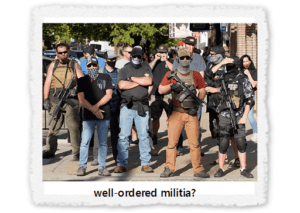
- For some reason “well-ordered” has been left out of the conversation.
Oxford, Uvalde and Chicago shock us. I have facilitated a support group for grieving parents for twelve years. Sadly, I can imagine the tsunami of grief that enters the world every time a young man decides to become a mass shooter. Sometimes the weapons used were not legally acquired. Many times they were.
This raises questions about what our Founding Fathers imagined for our country. We know in an era of powder horns and musket balls that large magazines of high-velocity bullets automatically fired was completely outside their understanding. However, being founded with an ability to arm ourselves against an exploitative monarchy, Americans owning guns seems to be part of our DNA. (The constitution, however, stipulates a “well-regulated militia.” It seems that ship has sailed. Gun advocates and lobbyists are strangely silent on this criteria.)
I heard a phrase in a recent campaign ad: “our God-given 2nd Amendment rights” to own guns. Few are disputing the rights to own guns in a nation that has ample need for hunting, home defense and livestock protection. But as a lifelong student of the Bible I can say with confidence that claiming divine authority for gun ownership in 21st-century America is absurd.
It is estimated that there are over 400 million guns in our country. The ship has also sailed on supposed liberal “gun-grabbing.” But it is a combination of gun regulation strategies that seem to have the most traction in our efforts to keep dangerous weapons away from Americans who are the highest risk to misuse them. For example, in many cases of mass shootings, other citizens had notified authorities about the threats posed by these shooters. Perhaps that process can be improved.
But as a pastor I tend to think more about the fence at the top of the cliff instead of the ambulance at the bottom. We live in a society that has not only retreated into anonymous, online “relationships,” but also recently experienced a dramatic increase in political division, social isolation and anxiety. A post-adolescent male from an abusive, broken family is bullied at school and then goes home to the basement where he plays violent video games and finds acceptance in hate groups. And then he begins to gather weapons… What can we do to help? How can we meet this young man and befriend him? How can churches offer him a life that is hopeful and loving? How can our school system, already a key source of social services, provide positive support to the angry, frustrated kids who fall through the cracks into dark places?
It takes a village. And as we have seen during the pandemic there are way too many Americans who only think of themselves and their homogeneous peers. But to help prevent heartbreak in places like Uvalde and Chicago, we need to participate in the entire social fabric of our communities and get involved—especially with our young people. That is a much more patriotic act than all of our flag-waving and online political ranting.
